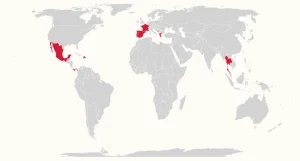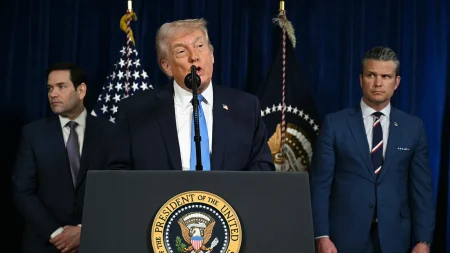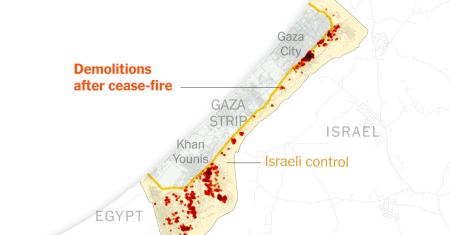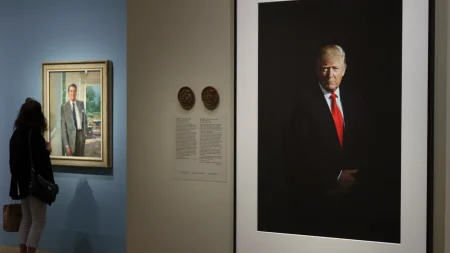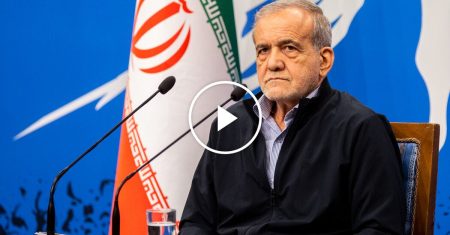Political Crisis Unfolds in West Africa as Military Seizes Power
Opposition Alleges Presidential Orchestration Behind Military Takeover
In a dramatic development that has sent shockwaves through the region, military forces announced Wednesday they have seized control of a West African nation, triggering immediate international concern and throwing the country into political uncertainty. Hours after the military’s declaration, the situation grew increasingly complex when the primary opposition leader made explosive accusations that the incumbent president had orchestrated the coup himself—an alleged desperate maneuver to retain power as his grip on leadership was weakening.
The military’s pre-dawn announcement came via state television, with uniformed officers declaring they had dissolved the constitution, dismissed the government, and closed national borders “until further notice.” Speaking from an undisclosed location, the apparent coup leader, whose identity and rank remain contested among various reports, cited “irreversible degradation of national security” and “systematic corruption” as justifications for the military intervention. International observers noted this follows a pattern seen in several neighboring countries where military forces have displaced civilian governments in recent years, contributing to a troubling regional trend of democratic backsliding across parts of West Africa.
What distinguishes this situation from other recent regional coups is the remarkable allegation made by the opposition leader, who appeared at a hastily arranged press conference in the late afternoon. “What we are witnessing is not a genuine military uprising but a carefully choreographed attempt by the president to circumvent constitutional term limits,” the opposition figure stated, surrounded by party officials. “Our intelligence sources confirm high-level meetings between the president and certain military commanders in the days preceding this so-called coup.” The opposition leader further claimed that the president, facing declining popularity and a challenging re-election campaign, had engineered the takeover as a pretext to declare a state of emergency, postpone elections indefinitely, and ultimately retain power through military proxies—allegations the presidential office vehemently denied in a statement released via diplomats abroad.
Regional Implications and International Response to the Crisis
The international community has responded with near-universal condemnation of the military action. The African Union immediately suspended the nation’s membership, while the regional economic bloc ECOWAS convened an emergency session and threatened possible sanctions. Western governments, including the United States and European Union, issued coordinated statements calling for an immediate return to constitutional order and the release of any detained government officials. “Democratic processes must be respected,” said one Western diplomat who requested anonymity due to the sensitive nature of ongoing negotiations. “We are deeply concerned about reports that civilian leadership may be detained, and we call for their immediate safety and release.” Meanwhile, regional security experts warn that the situation creates a dangerous power vacuum that could potentially be exploited by extremist groups operating in the Sahel region.
On the ground, the capital city presents a mixed picture of tension and uncertain calm. Military vehicles patrol major intersections, government buildings, and media facilities, while soldiers have established checkpoints on major roads leading into the capital. Some residents reported hearing sporadic gunfire overnight, though the city appeared relatively calm by midday. Markets remained partially open with reduced activity as citizens grappled with uncertainty about their immediate future. “We’ve seen this before in neighboring countries,” said one shopkeeper who declined to give his name. “The military comes, makes promises about fighting corruption and restoring order, but ordinary people continue to struggle.” Social media platforms experienced disruptions throughout the day, though many citizens used VPN services to circumvent restrictions and share information. Universities and schools announced immediate closures, while several international organizations evacuated non-essential staff.
Political analysts note this crisis emerges against a backdrop of longstanding challenges including economic stagnation, security concerns from regional extremist groups, and growing public frustration with perceived government corruption. The nation had been praised by international partners for its democratic transitions in previous years, making this apparent reversal particularly concerning to democracy advocates. “What makes these allegations of presidential involvement especially troubling is that they exploit the genuine grievances citizens have about governance failures,” explained a regional political analyst from a Dakar-based think tank. “Whether the opposition’s claims prove accurate or not, they resonate because they tap into widespread disillusionment with the political establishment.” As darkness fell over the capital Wednesday evening, the nation remained in limbo, with neither the military, the president, nor the opposition providing clear evidence for their competing narratives about who truly controls the country’s immediate future.
Historical Context and Factors Leading to the Current Standoff
This political crisis did not emerge in isolation but represents the culmination of months of escalating tensions between government forces, opposition groups, and increasingly restless military leadership. Since the contested elections three years ago, which international observers described as “flawed but largely reflecting the will of voters,” the incumbent administration has faced mounting criticism for its handling of economic policies and security challenges. Annual inflation reached double digits last quarter while unemployment among young adults approached 30 percent, creating fertile ground for political discontent. Additionally, border regions have experienced increased activity from armed groups, testing the military’s resources and resolve while highlighting governance gaps in remote areas.
The relationship between civilian leadership and military command has grown increasingly strained over the past year, with several high-profile disagreements about defense spending, strategic priorities, and allegations of political interference in military promotions. Just last month, the defense minister—a close presidential ally—announced a controversial restructuring of military leadership that was widely interpreted as an attempt to install loyalists in key positions ahead of planned elections. This move prompted unusual public criticism from retired officers and heightened tensions within active military ranks. “The civil-military relationship has been deteriorating for some time,” noted a security analyst who previously served as an advisor to the defense ministry. “What we’re seeing now represents the breaking point of institutional stresses that have been building for years.”
Adding further complexity to the situation, regional dynamics cannot be overlooked in understanding the current crisis. The country sits at a strategic crossroads for both legitimate trade and illicit trafficking networks, making control of government a prize sought by various internal and external interests. Several neighboring states have experienced their own political upheavals in recent years, creating a regional contagion effect that security experts have long warned about. Furthermore, foreign powers with economic and strategic interests in the region have maintained significant influence through military cooperation programs, development assistance, and resource extraction agreements—creating competing external pressures on domestic political actors.
Economic Consequences and Humanitarian Concerns Amid Uncertainty
The immediate economic impact of the political crisis became apparent within hours of the military’s announcement, as the national currency dropped sharply against the dollar in offshore trading. The central bank, apparently still under civilian control, issued a statement urging calm and assuring depositors that the banking system remained functional, though many branches closed early as a precautionary measure. The nation’s largest business association released a statement expressing “grave concern about the political uncertainty and its effect on investment climate and economic stability,” while urging all parties to find a peaceful resolution that respects constitutional processes. International credit rating agencies placed the country on negative watch, suggesting potential downgrades if the situation remains unresolved.
For ordinary citizens, the most pressing concerns center on daily survival amid the uncertainty. “People are panic-buying essentials because no one knows what happens next,” explained a community leader in one of the capital’s densely populated neighborhoods. “Prices for rice and cooking oil have already increased by fifteen percent since morning.” Humanitarian organizations operating in the country expressed particular concern for vulnerable populations, including the estimated 180,000 internally displaced persons who fled insecurity in border regions over the past two years. The UN humanitarian coordinator issued a statement urging all parties to ensure unhindered humanitarian access to affected communities regardless of political developments. Meanwhile, hospital administrators reported adequate medical supplies for immediate needs but expressed concern about potential disruptions to supply chains if border closures persist.
The timing of this crisis compounds existing challenges, as the country was already facing a difficult agricultural season due to irregular rainfall patterns affecting crop yields. Food security analysts had previously warned about potential shortages in certain regions before year’s end, a situation now potentially exacerbated by political instability. “When you combine pre-existing food security concerns with political uncertainty and potential market disruptions, you have a recipe for a humanitarian emergency if this situation is not resolved quickly,” warned the country director for an international aid organization. Additionally, several critical infrastructure projects, including power generation expansions and water treatment facilities funded by international partners, now face uncertain futures as foreign governments reassess their engagement with the country under military control.
Path Forward: Competing Scenarios and Prospects for Resolution
As the situation continues to evolve, several potential scenarios emerge for the days ahead. The first possibility involves confirmation of the opposition leader’s allegations, potentially leading to a complex political negotiation between military factions, the presidential camp, and opposition forces—all while international mediators attempt to broker a return to constitutional order. A second scenario sees the military consolidating control and establishing a transitional government, promising eventual elections while facing internal disagreements about leadership and direction. A third possibility involves counter-movements within the military itself, potentially leading to dangerous factional fighting if different units declare loyalty to competing civilian authorities.
Regional organizations, particularly ECOWAS, will likely play a central role in mediation efforts, drawing on their experience addressing similar situations in neighboring countries. “The regional bloc has developed protocols for responding to unconstitutional changes of government, but each situation presents unique challenges,” explained a former ECOWAS official now working with a conflict resolution organization. “The allegations of presidential involvement in orchestrating the coup—if substantiated—would present an unprecedented complication to standard mediation approaches.” Religious leaders and civil society organizations have already called for calm and dialogue, with several respected figures offering to facilitate discussions between the military and civilian authorities.
As night settled over the uncertain nation, citizens across the country tuned in to various information sources, attempting to discern truth from rumor in the competing narratives about their country’s future. Markets remained partially stocked but increasingly expensive, military vehicles continued their patrol of strategic locations, and diplomatic missions conducted frantic assessments of the fluid situation. What remains clear amidst the uncertainty is that the nation stands at a critical juncture, with decisions made in the coming days potentially determining whether it returns to constitutional governance or joins neighboring states in extended military rule. For a region already grappling with multiple security challenges, climate impacts, and economic pressures, another democratic reversal represents not just a national tragedy but a troubling indicator of broader regional fragility that international partners have thus far struggled to effectively address.
